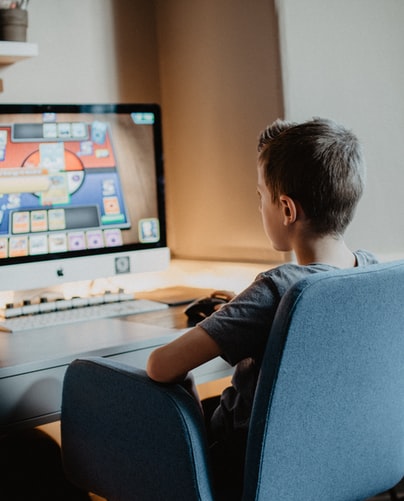
Believe it or not, only 48% of school-age children get 9 hours of sleep on weekdays, according to a 2019 study.
One reason for this is the large amount of time that kids spend playing video games.
Research shows that 66% of children between the ages of 8 and 12 play for 2 hours per day. But can gaming for lengthy periods of time really damage a child’s sleep?
The impact of video games
One study found that it takes longer for child gamers to fall asleep than those who didn’t play video games. The same study also revealed that young gamers experience less slow-wave sleep.
Slow-wave sleep is crucial as 95% of the body’s daily supply of growth hormones are produced while a child is in slow-wave sleep. The brain also processes and stores learned information during this sleep period, which highlights the importance of children getting a good night’s sleep, especially after a day at school.
REM sleep is also affected by video games by more than 10 minutes. REM sleep is just as important for children as it contributes to their brain development and promotes good physical and mental health.
Encouraging healthy gaming
Of course, lots of children enjoy playing video games and there are many benefits for kids who do play them. For example, video games are an effective way for kids to deal with lock-down.
Covid-19 has forced millions of children indoors, and video games can help them to overcome the stress and disruption associated with this. They’re also a great way to pass the time as a family and bring joy to a child’s life. But to ensure that a child’s sleep isn’t affected by their gaming habits, parents should limit the amount of time they’re allowed to play.
In one study, researchers compared the impact of 50 minutes and 150 minutes of gaming on a child’s sleep and discovered that a longer gaming period resulted in the child losing almost 30 minutes of sleep and it increased the amount of time it took for them to fall asleep.
Preventing gaming-related sleep issues
Time Magazine reports that children who have screens in their bedrooms are more likely to experience sleep issues than children who don’t have them.
This is for two reasons: they’re likely to play right before bed and parents are unable to monitor what they’re playing. Not only does this highlight the importance of removing screens from the bedroom, but it also shows that parents must ensure the video games their children are playing are age-appropriate. Violent games should particularly be discouraged as they can disrupt a child’s sleep by preventing a scared child from falling asleep and even causing nightmares.
Video games are played by millions of children every day, but this hobby could be doing more harm than good to a child’s sleep. As such, parents must ensure that healthy gaming habits are adopted at all times, including limiting game time and providing quality, educational games for their children to enjoy rather than aggressive ones.
Teenagers and Sleep: Help Them Get What They Need
Sterni and Crocetti both recommend that parents take teenagers and sleep seriously. Begin by modeling good sleep habits, such as adhering to a regular sleep schedule, cutting back on evening caffeine, and exercising regularly. They also suggest these teen-specific and time-tested tips.
Schedule a checkup. Pediatricians can educate teens on how much sleep is enough, recommend healthy sleep habits, and screen them for common teen sleep disorders, including sleep apnea, insomnia and circadian rhythm disorders.
Start the day in sunshine. Having breakfast outside or by a sunny window helps regulate the body’s biological clock, making it easier for teens to wake up in the morning and drift off at night.

Encourage the connection. When your teen is well-rested, ask how he felt that day while taking a test or playing a sport. Help him come to the conclusion that sleep improves his outlook—and help him realize how much sleep is enough.
Tie good sleep to car privileges. Sleep deprivation in teens can lead to accidents. “I tell my teenage son he can’t drive to school in the morning if he’s not getting enough sleep,” says Crocetti.
Help teens rethink their schedule. If your teen typically starts homework after evening activities, help him find an earlier time to get started. Ultra-busy schedules may require paring down.
Encourage afternoon naps. Tired teens may benefit from a 30- to 45-minute nap before dinner. This is a better fix for sleep deprivation in teens than sleeping-in, which throws off their body’s sleep cycle.
Ban tech from the bedroom. Using tech at night not only cuts into teens’ sleep time, it also exposes them to a type of light that suppresses the body’s production of the sleep-inducing hormone melatonin, making it tougher to fall asleep.
Encourage schools to move toward later start times. Many middle and high schools are exploring the idea of starting school around 8:30 a.m.—the time recommended by the American Academy of Pediatrics. Talk with your local school board about this issue.
Watch the summer shift. It’s normal for teenagers to want to shift their sleep schedule during the summer. Just make sure they don’t push bedtime too far past the one they had during the school year, advises Sterni. Teens whose schedules shift significantly may find it more difficult to return to an appropriate school sleep schedule and experience problems such as moodiness and excessive daytime sleepiness at the start of the school year. Those with significant shifts in their sleep schedule may need to see a sleep specialist to get back on track in September.

Sleep needs to become a priority.
Teens who are able to establish good sleep habits are significantly less likely to suffer from depression or to have suicidal thoughts.
Alaska Sleep Clinic is the leader in Alaska for Pediatric Sleep Studies. We know how important your child is to you and are here to help! Call Alaska Sleep Clinic
@ 907-770-9104in Anchorage, @ 907-420-0540 in Soldotna, @ 907-357-6700 in Wasilla or @ 907-374-3063 in Fairbanks.











